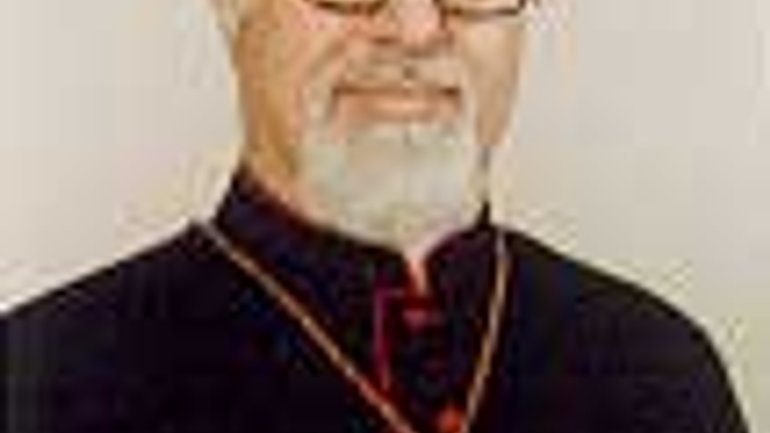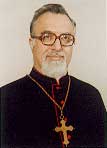Interview with Patriarch Nerses Bedros XIX

“We all want to pray for unity between Christians...”
Interview with His Beatitude Nerses Bedros XIX,
Patriarch of the Armenian Catholic Church

Bedros Tarmouni (Patriarch Nerses Bedros XIX) was born 17 January 1940 in Cairo (Egypt). He graduated from the Papal Armenian College and the Papal Gregorian University in Rome. He was ordained 15 August 1965 in Cairo, where he then served as pastor. On 18 February 1990 he was ordained bishop of Alexandria for Egypt and Sudan. In October 1999, the Synod of Bishops of the Armenian Catholic Church elected him Patriarch-Catholicos of Cilicia for Catholic Armenians, after which he took the name of Nerses Bedros XIX.
Photo from ecah.homestead.com/Patr.html
- What are your impressions of the current state of the Armenian Catholic Church in Ukraine?
When I came to Ukraine, of course I knew that there were Armenian Catholics living in the country. However, over the last decade, or to be more exact, since World War II, there has been no priest to organize the community. Therefore, I didn't know precisely where the parishes existed and how many churches remained. During my ten-day stay in Ukraine I had an opportunity to visit various places, in particular the former parishes of the Armenian archeparchy in Lviv, which had been functioning before the war.
I also learned about communities that didn't belong to the Lviv archeparchy, for instance, in Khmelnytskyi, Kamianets-Podilskyi, Chernivtsi, where the cathedral has been preserved, and Kharkiv. I was able to visit these communities and I am pleased to note that they do exist and some of them, in Lviv and Khmelnytskyi, have already been registered. The registration process of the Kharkiv community is continuing; two other communities, in Chernivtsi and Kuty, have already prepared all the necessary paperwork. I am sure that as soon as a priest begins to work here permanently (which I hope will happen shortly) we will know precisely how many Armenian Catholics reside in these and other cities.
- Please comment on relationships between the Armenian Catholic and Armenian Apostolic Churches:
The Catholicos of all Armenians of the Apostolic Church, His Holiness Karekin II, and I correspond with each other regularly and maintain good fraternal relations. In February this year when we began the celebration of the 1700th anniversary of the Armenian Church, I invited Catholicos Karekin II to participate in the ceremonies. The Catholicos delegated Archbishop Gregory Gabroian of Paris, who on his behalf participated in the solemn Liturgy in St. Peter's Basilica in the Pope's presence. Still earlier, in November 2000, when Catholicos Karekin II visited Rome, he and the delegation of the Armenian Apostolic Church received our warmest and most hospitable welcome in the Armenian Catholic College in Rome.
In response, His Holiness Karekin II invited me to take part in the celebrations of the 1700th anniversary of the country's baptism, held 21 to 23 September 2001 in Armenia. I, among representatives of other churches, was an official guest of the Catholicos of all Armenians. Afterwards I received a letter of gratitude for my participation, to which I responded. So at the official level we maintain good relationships with the Apostolic Armenians.
As you know, Lviv is home to a historic Armenian Catholic cathedral. Because there were no Armenian Catholics to worship in it, the city authorities handed the cathedral over to Apostolic Armenians on condition that both communities could use it. Last sunday [4 November 2001] when I arrived in Lviv, I had the opportunity to conduct a service in the cathedral, a memorial service for the second to last Armenian archbishop, Isak Isakovych, in the presence of an Armenian Apostolic priest and a part of the community.
Today, right before your visit, I received the pastor of the Apostolic Armenians in Lviv, Father Thaddeus Georgian, and the vice-president of the Armenian Apostolic community in Ukraine, Mr. Mykola Kocharian, who came to greet me. The meeting turned out to be very warm and sincere. I believe that our friendly relations with the Apostolic Armenians in Lviv can serve as a good example of communication for other Christian communities. We all want to pray for unity between Christians, so that mankind will believe that God sent his Son to save the world, as we read in the holy Bible.
- Do Apostolic and Catholic Armenians manage to maintain good relations everywhere in the world?
On the whole, they do. However, one should not forget that in reality not all Apostolic Armenians in the world are subordinate to the Catholicos of all Armenians, Karekin II of Etchmiadzin. There is another catholicosate, called the "great house" of Cilicia in Lebanon, headed by Aram I. It should also be mentioned that for a certain period of time some fanatical groups were in the focus of attention. So there are minor problems in some regions, but these are really secondary.
- Do you think full eucharistic communion between the Armenian Apostolic and Catholic Churches is possible? Such a possibility is being considered by the leading hierarchs of the Antiochene Church, which also experienced schism. A similar idea was proposed by the Kyivan Church Study Group in relation to the Ukrainian Orthodox and Catholic churches.
The idea of full eucharistic communion is a very interesting and a very deep question, but the Antiochene Church never succeeded in solving this issue. After the Synod thoroughly considered the problem, Patriarch Ignatius IV decided that eucharistic communion should be reached in the context of the Orthodox and Catholic churches on the whole, not only between Ignatius IV (Hazim), patriarch of Antioch for the Greek Orthodox, and Gregory III (Laham), patriarch of Antioch for Greek Catholics (Melkites).
I must also add that in practice the theological dialogue between the Armenian Apostolic and Catholic churches is rather a dialogue between the Apostolic Armenians and the Vatican and not directly with us. We are, nevertheless, obviously interested in reaching an agreement and creating a community of love.
Finally, I would like to thank you for your interest in the Armenian Church and the issue of ecumenism. I am pleased to observe that you have a chance to research these problems as theologians or students of theology and also that Ukrainians have the right to be informed on the state of affairs inside the Church.
(The interview was conducted by Taras HRYNCHYSHYN, RISU's research director, on 8 November 2001, in the Metropolitan's Chambers of St. George Cathedral in Lviv. Father Archimandrite Sergius GAYEK, apostolic visitator for Greek Catholics in Belarus, who accompanied the patriarch on the journey, also participated in the interview.)









